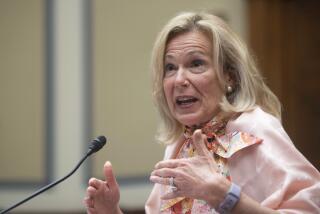Former U.S. envoy critical of Japan’s nuclear crisis response
- Share via
Reporting from Seoul — Relations between the United States and Japan, already strained over the delayed relocation of an American military base on Okinawa, received no help this week when a retired U.S. envoy publicly criticized Tokyo’s initial response in March to the nation’s nuclear crisis.
Comments by Kevin Maher, a former director of the State Department’s Japan Office, shed light on Washington’s mind-set during the early days of the crisis at the Fukushima Daiichi nuclear power plant.
Speaking to reporters in Tokyo, Maher said U.S. officials worried about the lack of leadership shown by Prime Minister Naoto Kan’s government after the March 11 earthquake and tsunami led to partial reactor meltdowns at the coastal plant.
At one point, Maher said, the Obama administration considered a worst-case scenario of evacuating tens of thousands of U.S. citizens from the Tokyo metropolitan area.
“There was nobody in charge,” Maher said Thursday at a speech at the Foreign Correspondents Club of Japan. “Nobody in the Japanese political system was willing to say, ‘I’m going to take responsibility and make decisions.’ ”
The former envoy, who coordinated U.S. assistance to Japan during the crisis, said progress was made only after Tokyo and Washington launched a joint task force. Before that, Maher said, “nothing was taking place at Fukushima Daiichi in terms of the government solving the problem.”
Kan is set to step down amid a flurry of criticism that his government mishandled the crisis. Among the alleged missteps were downplaying the radiation risk in Tokyo after the nuclear disaster and allowing officials at Tokyo Electric Power Co., the utility that runs the crippled plant, too much leeway in handling the situation.
Japanese officials did not respond to Maher’s comments.
The outspoken Maher is no stranger to controversy. The day before the March earthquake, he was dismissed for insulting comments about Okinawa residents that he reportedly made in December during an off-the-record State Department briefing for U.S. university students.
Fluent in Japanese, with nearly two decades of experience in the country, Maher was asked to stay on to direct a crisis task force being assembled in Washington that consisted of 100 U.S. nuclear and defense experts.
Information gleaned by a remotely piloted plane over the ailing nuclear plant immediately troubled U.S. officials, especially photos that suggested high temperatures inside the reactor buildings, signaling a possible meltdown, Maher said.
“When you looked at the information we did have, it was very clear to me early on that there had probably been at least one, probably two meltdowns,” he told reporters. “We were very worried about what was going to happen to Japan.”
Worse, he said, critical information about the unfolding crisis was not being shared among Japanese governmental agencies.
He said the once-considered withdrawal of U.S. troops from Japan as a safety measure during the crisis could have caused a “tremendous negative impact” on an already complicated U.S.-Japan security alliance.
Maher also denied referring to Okinawa residents as “lazy” and “masters of manipulation and extortion,” saying that his comments, first reported by Japan’s Kyodo News agency, were misquoted.
More to Read
Sign up for Essential California
The most important California stories and recommendations in your inbox every morning.
You may occasionally receive promotional content from the Los Angeles Times.










